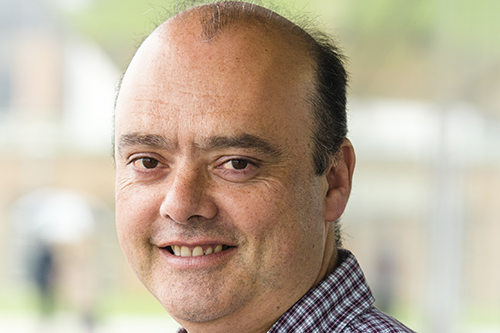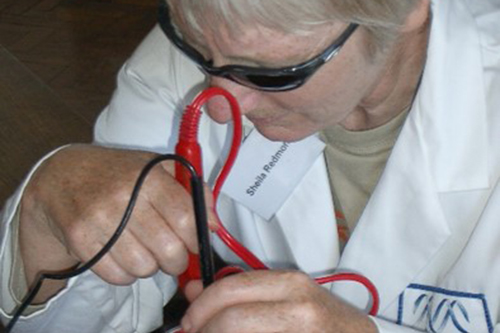Dudley Shallcross, Professor of Atmospheric Chemistry, has been awarded an OBE for his outstanding contribution to Science education in the UK and overseas.
Professor Shallcross said: “My daughter picked up the morning post with an envelope from the Cabinet Office, so I invited her to open it. It was quite a surprise and my whole family is now very excited. They have been incredibly supportive throughout my career, as have all the brilliantly talented people I’ve been fortunate to work with over the years. So, this award is a massive collective and I just want to say the biggest thank you!”
His teaching career started at the University as a lecturer in chemistry in 1999 after studying at the universities of Southampton, Oxford and Cambridge. The following year sparked his interest in nurturing science talent in children, which fast became a lifelong passion.
“In my second year, I was offered a couple of admin jobs, but I chose schools outreach, which wasn’t a popular choice with young academics at the time. But I really enjoyed it and soon met with secondary school teachers across the city, forging an effective link with the University,” Professor Shallcross said.
Within a few years he was awarded the University’s first National Teaching Fellowship and soon after the School of Chemistry was made a Centre for Excellence in Teaching and Learning, called Bristol ChemLabS.
A firm believer in bringing the laboratory to life, Professor Shallcross and the Bristol ChemLabS team pioneered virtual labs, preparing students for laboratories by building on their enthusiasm and competence. Training and supporting science teachers using the new real and virtual labs gave these teachers, many not chemistry specialists, confidence to conduct experiments, including the more dramatic ones, with students.
He said: “Creating experiments is the magic of chemistry, but some teachers were fearful of them. If done properly and safely, they can help inspire future scientists, sparking their curiosity and appetite to learn.”
His extensive outreach work has involved bringing secondary schools from across the country and globe into the School of Chemistry labs.
“Out of term time, our labs were packed with children not only from UK schools, but also from Ireland, France, Malta, and Singapore to name a few. It was brilliant,” he said.
His revolutionary work continued when he was appointed Director of the Primary Science Teaching Trust – a role which allowed him to transform the dynamic of teaching science at primary school level.
“I formed a virtual college, which became a forum for hundreds of excellent teachers to learn from and support each other. Having a science background to teach science at a primary level is not essential, it’s about developing inquisitive natures,” Professor Shallcross said.
In 2020 he was made President of the Education Division at the Royal Society of Chemistry, coinciding with the COVID-19 pandemic. His experience in virtual lab work and instruments proved pivotal, and helped scores of institutions deliver practical learning during public lockdown restrictions.
A staunch champion of Equality, Diversity, and Inclusion (ED&I), Professor Shallcross introduced virtual labs at the University of the Western Cape in South Africa. It has since been rolled out across the country, where access to laboratories is limited.
“The virtual lab environment develops skills, lowers anxiety, and reduces breakages. It’s so popular that students have collectively spent as long in the virtual labs as an actual one, which is hugely satisfying and an important step forward in overcoming inequalities and developing fantastic talent,” Professor Shallcross explained.
“Working with students and teachers from a variety of backgrounds, for example South African townships and first peoples in Australia has been a privilege. We have learned so much from each other and lifelong friendships have been formed.”
The summer schools have also supported visually impaired adults, giving blind students their first experience in a lab and an opportunity to perform exciting experiments.
He added: “This is one of the most satisfying parts of my work – supporting people to change the course of their life and be passionate about science.”
Professor Shallcross lives locally with his wife Karen and their four children, who he hopes will join him at the investiture ceremony.
He said: “This award is the culmination of a massive team effort, thanks to my amazing family and colleagues. I’m incredibly grateful and proud of them all. I must pay tribute in particular to my very good friend and colleague Tim Harrison, who worked with me on many of these projects and sadly died in January last year, before being able to accept an MBE award.”

